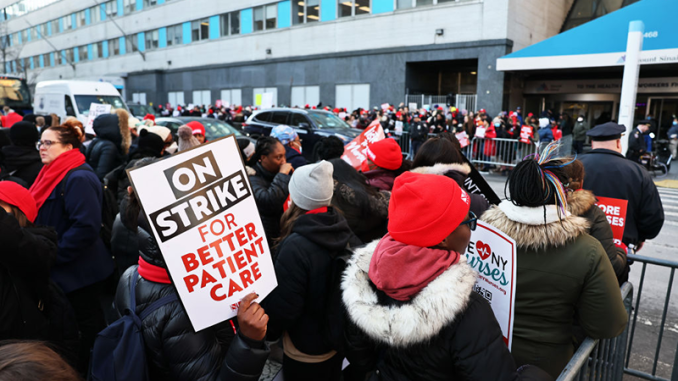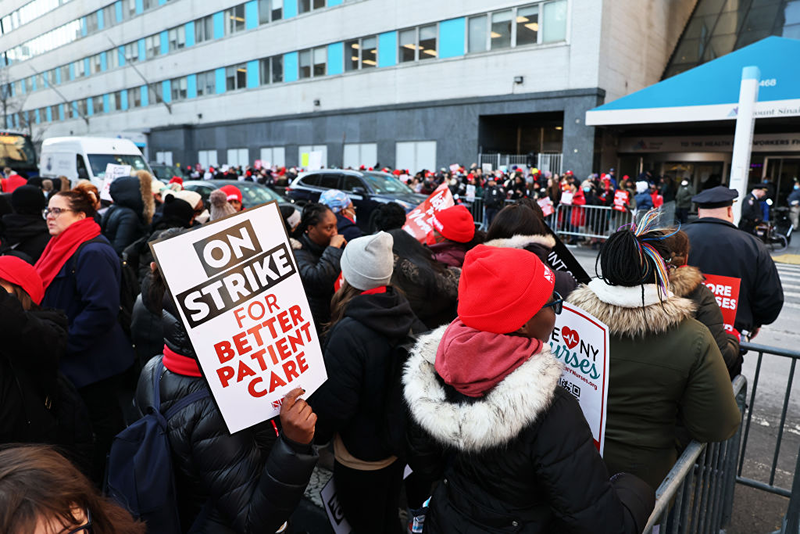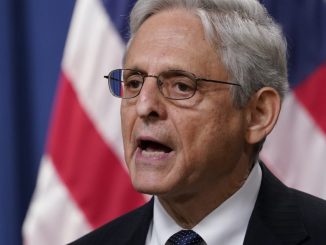

OAN Shannon Kelland
UPDATED 11:43 AM PT – Tuesday, January 10, 2023
Nurses from Mount Sinai and Montefiore Medical Centers have entered day two of strike picket lines after not yet coming to a contract agreement.
The strikes began in the Harlem, the Bronx and the Upper East Side over staffing issues on Monday and continued into Tuesday.
Currently, both hospitals claim that people are still able to continue receiving care, despite the strikes.
On Tuesday, picketing resumed. Montefiore and the New York State Nurses Association (NYSNA) went back into negotiations at 10 a.m. Tuesday. At this time, negotiation sessions had been scheduled at Mount Sinai.
The strikes began on Monday, when over 7,000 nurses at two New York City hospitals walked out of negotiations. Nurses at both hospitals failed to reach an agreement with hospital administration during a bargaining session on Sunday night. The union said their concerns are around staffing issues, better pay, and better working conditions that had not been addressed by management.
The nurses, who are part of the NYSNA, claim that management has failed to fill critical vacancies and make pay competitive enough to attract new employees.
President of the New York State AFL-CIO, a labor union, Mario Cilento published a statement Monday.
“These nurses are dedicated professionals who provide quality patient care under unimaginable conditions day in and day out that were exacerbated by the pandemic,” he said. “Now they are faced with the added challenge of short staffing that has reached critical levels and could compromise their ability to provide the best quality care to their patients.”
“It is time for the hospitals to treat these nurses fairly, with the dignity and respect they deserve, and to negotiate in good faith, quickly, to ensure nurses can get back to serving their communities by providing superior care to their patients,” the statement continued.
Montefiore Medical Center stated that they offered nurses a 19.1% compounded wage increase and promised to create more than 170 new nursing positions prior to the strike taking place. The center then accused union leaders of walking “away from the bedsides of their patients.”
Lucia Lee, Mount Sinai’s spokesperson, made a statement regarding what their facility offered nurses before the strike.
“NYSNA leadership walked out of negotiations shortly after 1:00 a.m. ET, refusing to accept the exact same 19.1% increased wage offer agreed to by eight other hospitals, including two other Mount Sinai Health System campuses, and disregarding the governor’s solution to avoid a strike,” she said.
Nurses said the decision to strike came after Mount Sinai and Montefiore failed to take negotiations seriously.
“They’ve been dismissive. They’ve been disrespectful. They ignore us. They’re blaming us for abandoning patients and being irresponsible. But the hospital’s been abandoning patients for the past several years when they refuse to give us adequate staffing,” a labor nurse said.
Martin Speiser, from the Mount Sinai emergency department, claimed staff shortages caused longer wait times for patients in the emergency room and strained staff were forced to balance out care.
“Medications fall behind, labs fall behind. I can’t talk to doctors as often as I need to. I can’t update patients and families. There’s not enough time,” he said.
Mount Sinai Neonatal Intensive Care Unit (NICU) and the Intensive Care Unit (ICU) have been suffering the most. Bianca Russo, a 27-year-old nurse from the Mount Sinai neonatal intensive care unit (NICU) who has been working at the hospital for almost five years, commented on the situation.
“We don’t have enough staff members to take care of one of the most vulnerable populations in this hospital,” she said.
Nurses were often caring for three to four sick infants at a time, even though NICU patients should be treated one-to-one. In addition, they were left to change, feed and provide medical care for multiple infants at once.
An intensive care unit (ICU) nurse, Roxanna Garcia, who works at Montefiore Medical Center joined the Mount Sinai strike to show solidarity. Garcia claimed that ICU staff often cared for three to four patients at once, compared with the one to two to whom they should be assigned.
Nurses regularly worked 12- or 13-hour grueling shifts often without a complete break. Most of the time they are not able to go to the bathroom regularly while supervising patients with mental health issues and extreme medical needs due to having no one to relieve them.
“It’s terribly unsafe for the patients, terribly unsafe for the nurse,” Garcia said.





Be the first to comment